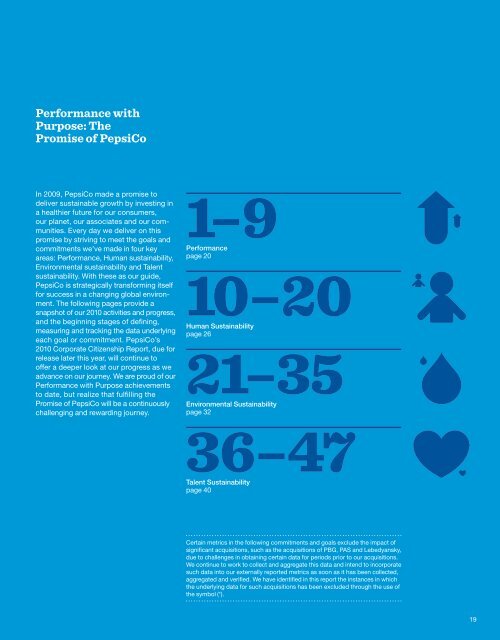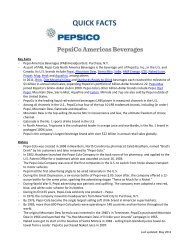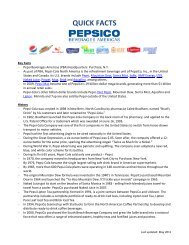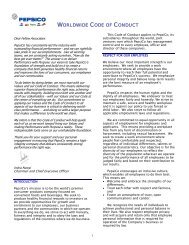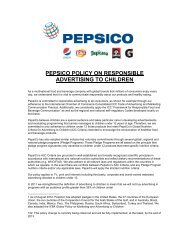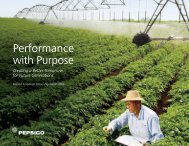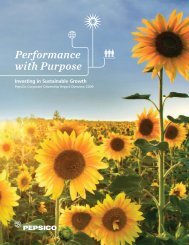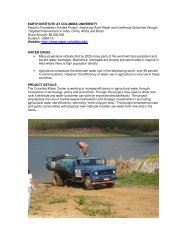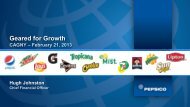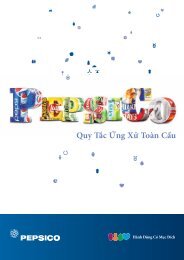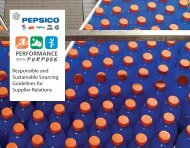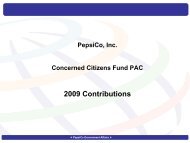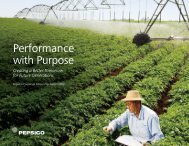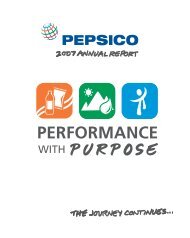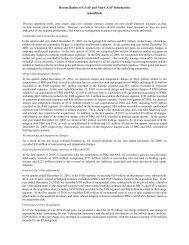Performance With Purpose: The Promise Of PepsiCo 1
Performance With Purpose: The Promise Of PepsiCo 1
Performance With Purpose: The Promise Of PepsiCo 1
- No tags were found...
You also want an ePaper? Increase the reach of your titles
YUMPU automatically turns print PDFs into web optimized ePapers that Google loves.
1–9<strong>Performance</strong>To all our investors … It’s a promise to strive todeliver superior, sustainable financial performance.20 <strong>PepsiCo</strong>, Inc. 2010 Annual Report
<strong>Performance</strong>Top Line1Grow internationalrevenues at twotimes real global GDPgrowth rate.As the world’s second-largest food andbeverage business, we make, market orsell our products in more than 200countries. In fact, more than 45 percentof our business comes from outside theU.S. In 2010, our revenues outsidethe U.S. grew approximately 30 percent,significantly above our target of twotimes the real global GDP growth rate.Notably, our India business grew atabout 2.5 times India’s real GDP growthrate and our Brazil business grew atabout 3.5 times Brazil’s real GDP growthrate. And we continue to strengthen ourgrowth potential with strategic investmentsin key markets. In 2011, forexample, we acquired a controlling interestin Wimm-Bill-Dann, Russia’slargest food and beverage business, andmade plans in 2010 to build a newplant, part of a $1 billion investmentprogram there. We also initiated a$2.5 billion investment program inChina in 2010, which includes plans toopen 10 to 12 new food and beverageplants and R&D facilities over threeyears. <strong>With</strong> these and other investments,we expect to continue increasing ourinternational revenues at a faster pacethan that of the world economy.We opened a snacks plant in Azov, Russia, in2009, and announced plans to build a beverageplant on the same property in 2010. This is justpart of our commitment to growing internationalrevenues through investments.2Grow savory snack andliquid refreshment beveragemarket share in thetop 20 markets.We’re committed to growing ourbusinesses faster than the market.In 2010, we grew share in manyof our top 20 markets where weincreased the relevance of ourbrands to consumers, introducednew products that meetchanging tastes or extended ourportfolio into fast-growingcategory sub-segments. Forexample, Pepsi Max offers azero-calorie beverage option inmarkets where consumers arelooking for healthier choiceswhile maintaining great taste.In 2011, we are pursuing similarstrategies: 50 percent of Frito-Lay’s snacks will be made withall-natural ingredients,a highly demanded consumerproduct sub-category.21
3Sustain or improvebrand equity scores for<strong>PepsiCo</strong>’s 19 billiondollarbrands in the top10 markets.<strong>The</strong> reputation and performance of ourbrands are critical to building brandequity scores. We have sustained or grownbrand equity in the majority of the topmarkets for most of our 19 billion-dollarbrands. Driving these overall positiveresults have been very successful consumerengagement programs on ourbillion-dollar brands across the globe,such as the “Do Us a Flavour” competitionsin the U.K. (Walkers), theNetherlands (Lay’s) and India (Lay’s).<strong>The</strong>se programs allow consumers tohave a say in selecting new flavorsintroduced by the brands, through textand online messages. Mountain Dewdeveloped a partnership with consumersin the DEWmocracy 2 campaignto create three new DEW flavor innovations.And through the GatoradeMission Control social media platform,which tracks online sports performanceconversations in real time andthen uses the information to deepenconsumer engagement, we are able toadjust marketing plans and influenceproduct innovation.Gatorade’s Mission Control monitors, reactsand engages with consumers in real time acrossthe social web, building awareness of the brand.22 <strong>PepsiCo</strong>, Inc. 2010 Annual Report
Learn more about the Walkers“Do Us a Flavour” campaign atwww.tinyurl.com/pepsico1.4Rank among the top twosuppliers in customer (retailpartner) surveys wherethird-party measures exist.We know that being viewed as a premiersupplier by our customers is part of oursuccess, and we pride ourselves on deliveringsuperior value and expertise to ourcustomers in important areas, includingconsumer insights, innovative marketingand supply chain management.Assessing our performance through ourcustomers’ eyes ensures we are focusedon the areas they believe are mostimportant. Many retailers today havesupplier scorecards that measure importantsales and operational metrics. Inaddition, we also leverage third-partybenchmarking tools from the U.S.’sKantar Retail surveys and globally throughthe Advantage Group Internationalsurvey. In Kantar Retail’s 2010 surveys,<strong>PepsiCo</strong> ranked among the top two foodservicesuppliers in the U.S. and rankednumber four among retail customers.We delivered year-over-year improvementsin the areas of supply chain managementand customer sales teams.Where we have dedicated <strong>PepsiCo</strong>Power of One retail customer teams, weranked number three overall andnumber one for insights. Inter nationally,we had strong results in the AdvantageGroup International’s Advantage Reportin a number of countries. In the U.K.,Walkers was ranked number two foroverall performance among sixteen confectioneryand snack food companies.Tropicana, in the U.K., was ranked numberone out of thirteen companies in therefrigerated dairy and juice category. InCanada, Frito-Lay was ranked numberthree among a total of 23 fast-movingconsumer goods companies in the grocerychannel. Going forward, we plan toexpand our Power of One approach to abroader set of key customers and expectthe efforts to translate into positiveresults in future surveys.23
<strong>Performance</strong>Bottom Line5Continue to expanddivision operatingmargins.<strong>PepsiCo</strong> is committed to deliveringsustainable operating performance. Inorder to succeed, we know it’s importantto balance both the short and the longterm. <strong>The</strong> 2010 acquisition of ouranchor bottlers in North America andEurope, for example, enables us to drivegrowth, ensure a dynamic future for<strong>PepsiCo</strong> and create a more integratedsupply chain. As expected, the decisionto acquire these bottlers reduced overalldivision operating margins in 2010.However, we also understood that realizingoperational synergies would betterposition us to increase margins over thelong term. We also invested in some keygrowth drivers of our business, includingexpanding our business in China(one of our priority growth markets) andincreasing advertising and marketingspending in our North America beverageand U.S. Quaker Foods businesses.Through these and other investments,we expect to increase overall divisionoperating margins over time.Three yearsended 2010:operatingcash flow >net income6Increase cash flow inproportion to net incomegrowth over three-yearwindows.In the three years ended 2010, operatingcash flow significantly outpaced therate of net income. We believe that ourdisciplined approach to cash flow managementwill enable us to continue tomeet or exceed this goal in the future.7Deliver total shareholderreturns in the top quartile ofour industry group.We deliver strong returns to our shareholdersthrough substantial profitgrowth, sound investment decisionsand disciplined cash flow management.We increased our annual dividend in2010 for the 38th consecutive year, from$1.80 to $1.92, or 7 percent, and wereturned a total of $8 billion to shareholdersin the form of share repurchasesand dividends. From 2001-2005, ourtotal cash returned to shareholders was$18 billion. Over the five-year periodfrom 2006 to 2010, which included theeconomic turmoil of recent years, our24 <strong>PepsiCo</strong>, Inc. 2010 Annual Report
Human SustainabilityProducts10Increase the amount ofwhole grains, fruits,vegetables, nuts, seedsand low-fat dairy in ourglobal product portfolio.We’ve made great strides in increasingthe amount of wholesome foods acrossour global portfolio. Through estimated2010 U.S. data, the Quaker divisionis expected to have contributed nearly500 million pounds of whole grainsto the American diet. In Russia, with theacquisition of Lebedyansky in 2009, webecame the number one juice companyacross Europe and expect to have sold230 million servings of 100 percent juicein Russia in 2010. During the same year,Sabritas is estimated to have deliveredmore than 19 million pounds of nutsand seeds to Mexican consumers throughits varied nuts and seeds product portfolio.In 2010, we also formed our GlobalNutrition Group, which we believe willhelp us strive to become the leadingprovider of Good-for-You foods andbeverages. This groundbreaking initiativeis intended to help accelerate thegrowth of our Good-for-You productsfrom $10 billion in net revenue in 2010to $30 billion by 2020.$10 billionIn 2010, our Good-for-You portfoliodelivered $10 billion in net revenue.27
Learn more about Frito-Lay’snatural ingredients atwww.tinyurl.com/pepsico2.11Reduce the average amount ofsodium per serving in key globalfood brands, in key countries,by 25 percent by 2015, comparedto a 2006 baseline.We are making good progress in reducingsodium in many of our key globalfood brands. In the U.K., Walkers hassignificantly reduced sodium by 25 to55+ percent in its products since 2005,while continuing to be the country’snumber one selling brand of crisps. Inthe U.S., Frito-Lay developed “LightlySalted” versions of Fritos corn chips andRold Gold Tiny Twist pretzels in 2010,each with 50 percent less sodium thantheir original versions. And in 2011,Frito-Lay in the U.S. will reduce sodiumby nearly 25 percent, on average, acrossits entire flavored potato chip portfolio,including Lay’s. In Brazil, we reducedsodium in one of our most popular snacks,Fandangos, by more than 30 percent,while expecting to achieve volume growthof more than 50 percent from 2006 to2010. In 2011, we will continue to investin developing different approaches tosodium reduction in our food brands,including the development of differentsalt crystal shapes that deliver greattaste with less sodium. <strong>With</strong> these andother initiatives, we believe we are ontrack to meet our 2015 goal.12Reduce the averageamount of saturated fatper serving in key globalfood brands, in keycountries, by 15 percentby 2020, compared toa 2006 baseline.We’ve been an industry leader ineliminating nearly all trans fatsfrom our U.S. product portfolioand many of our global products;and now we’re committed toreducing the saturated fat contentof our key global food brands. InIndia, for example, we’re usingblended rice bran oil, whichhas led to a 40 percent decreasein saturated fat in leadingproducts such as Kurkure namkeensnacks and Lay’s potatochips. In China, increased salesof our Quaker products hasbeen a driver behind a 10 percentdecrease in saturated fat perserving across our foods portfolio.And in Russia, saturatedfat levels have been reduced byalmost 13 percent through theintroduction of lower-saturatedfatversions of Cheetos and themore than 300 percent growthof low-saturated-fat Hrusteamproducts since 2006. In 2010, welaunched versions of Cheetosand Fandangos in Brazil madewith heart-healthier sunfloweroil, and expect to incorporate itinto other products throughoutthe world. To reach our 2020goal, however, we will need tocontinue developing productsthat are great tasting with lesssaturated fat.13Reduce the averageamount of added sugarper serving in key globalbeverage brands, in keycountries, by 25 percentby 2020, compared toa 2006 baseline.While reducing added sugars in beveragesis challenging — due to strongconsumer taste preferences for sugarand complex regulatory processes foralternatives — we have set aggressive28 <strong>PepsiCo</strong>, Inc. 2010 Annual Report
16Eliminate the directsale of full-sugar softdrinks to primaryand secondary schoolsaround the globe by 2012.<strong>PepsiCo</strong> continues to implement a globalpolicy for beverage sales in schools —focused on water, juice, milk and lowcaloriebeverages that support healthynutrition habits among students. By2012, when the global school beveragepolicy is fully implemented, we will nolonger sell full-sugar soft drinks directlyto primary or secondary schools worldwide.<strong>The</strong>se changes have already beenmade in a number of key markets. Forexample, between 2006 and 2009, wevoluntarily discontinued direct sales offull-sugar soft drinks to K–12 schools inthe U.S. and replaced them with smallerportionedand lower-calorie beverageoptions. We also do not sell full-sugar softdrinks directly to primary and, in somecases, secondary schools in most ofEurope, Canada, Australia and the majorityof countries in the Arabian Peninsula.17Increase the range of foodsand beverages that offersolutions for managing calories,like portion sizes.In 2010, we continued to provide consumerswith options to manage calorieintake, from launching new productswith zero- and low-calorie sweetenersto reformulating existing products withfewer calories. Naked Juice, for example,introduced two 100 percent juicesmoothies that have 35 percent fewercalories than regular Naked JuiceSmoothies, and Tropicana added newflavors — such as Pomegranate Blueberry,Pineapple Mango and FarmstandApple — to its Trop50 line, which offers50 percent less sugar and fewer calorieswith no artificial sweeteners. In theU.K., we launched a 600ml zero-caloriecola at the same recommended retailprice as a 500ml full-sugar cola. And inBrazil, we recently acquired Amacocothat positions us to broaden the distributionand sales of our lower-sugarcoconut water product line. On the foodsside, we utilized our expertise in bakingand air-popping technologies to managecalories. In Mexico, a baking techniqueis used to produce a version of Sabritaspotato chips that has 20 percent fewercalories. Several of our products, includingSunChips, Sabra, Quaker’s Quakesand True Delights rice snacks were recognizedon Good Housekeeping’s “BestLow-Calorie Snack” list.30 <strong>PepsiCo</strong>, Inc. 2010 Annual Report
Human SustainabilityCommunity18Invest in our business andresearch and development toexpand our offerings of moreaffordable, nutritionallyrelevant products for underservedand lower-incomecommunities.We have strengthened our efforts tointroduce affordable nutrition and aremaking strides to meet this long-termgoal. For example, we developed a planto launch affordable, fortified snacksand biscuits in India to address irondeficiencyanemia, with a pilot launchscheduled for Andhra Pradesh in Indiain 2011. Additionally, we are investingin research to identify key nutrientdensestaple crops that can be used inlocally produced nutritious foodsand snacks for sub-Saharan Africa.19Expand <strong>PepsiCo</strong> Foundationand <strong>PepsiCo</strong> corporatecontribution initiatives topromote healthier communities,including enhancing dietand physical activity programs.<strong>The</strong> <strong>PepsiCo</strong> Foundation is committedto helping people with the greatest healthdisparities achieve improved health andnutrition through effective and sustainableprograms. Through a combinationof Foundation grants and corporatecontributions, we increased our annualinvestment from $4.2 million in 2006 to$4.7 million in 2010. In the U.S., theFoundation has contributed $2.5 millionto the Healthy Weight CommitmentFoundation — a coalition of businesses,nonprofit organizations and athletescommitted to reducing obesity by 2015.<strong>The</strong> grant is being used for a publiceducation campaign for moms and kids,and to implement a school-basedprogram. <strong>PepsiCo</strong> continued to supportthe YMCA of the USA to improve thehealth, nutrition and well-being ofunderserved African-American andLatino populations — a collaborativeprogram that has reached nearly40,000 people in 85 communities. <strong>The</strong>Foundation’s strong partnership withSave the Children has reached approximately850,000 people in India andBangladesh to help improve health andnutrition. And the Foundation’s partnershipwith the World Food Program(WFP), which leverages <strong>PepsiCo</strong>’s supplychain expertise to improve theWFP’s logistics efficiency, will indirectlybenefit approximately 90 millionpeople served by the program.20Integrate our policies andactions on human health,agriculture and the environmentto make sure thatthey support each other.Human health and environmental protectionare two critical components ofsustainable development. To ensure thatour efforts in these areas are as cohesiveand productive as possible, we havebegun to develop a formal policy to coordinateour human health, agricultureand environment-related initiatives. In2010, we championed a coordinatedapproach within the World EconomicForum (WEF) and, in partnership withsome of the world’s foremost thinkersin these key areas, called for governmentsand corporations to embrace anintegrated approach to sustainabledevelopment and nutrition. In 2011 andbeyond, we will accelerate our efforts,engaging our internal team of experts tocreate an integrated framework forcompany policies and practices that canbe used to reach our goal and to serve asa basis for our Global Nutrition Group.31
Environmental SustainabilityWater21Improve our water-useefficiency by 20 percentper unit of productionby 2015.Water efficiency has long been an environmentalfocus at <strong>PepsiCo</strong>. Throughthe third quarter of 2010, our global foodand beverage businesses reduced wateruseintensity by 19.5 percent versus2006. And we’re on track to achieve our2015 target for company-owned facilities.Upgrading our facilities with newtechnologies is one important way weare reaching this goal. For example, ourFrito-Lay facility in Casa Grande,Arizona has been equipped with a stateof-the-artwater filtration andpurification system that can recycle andreuse up to 75 percent of the waterused in production. Similar technologyis also being deployed in our Tingalpafacility in Australia, a water-stressedarea. We will continue to apply lessonslearned in one facility to others acrossour global footprint. (*)Reduced wateruseintensity by19.5 percent as ofthird quarter 2010,compared to our2006 baseline.(*)At our Frito-Lay facility in Casa Grande, Arizona,we are applying membrane bioreactor and lowpressurereverse osmosis technology to purify andrecycle up to 75 percent of the site’s process water.22Strive for positivewater balance in ouroperations in waterdistressedareas.In 2009, <strong>PepsiCo</strong>’s operations inIndia achieved positive waterbalance, enabling us to give backto society more water than weused to manufacture our products.To expand this achievementto other water-distressedareas where we have a presence,we have launched a number ofprojects. In 2010, for example,we began working with <strong>The</strong>Nature Conservancy to developways to identify areas of highwater risk, so we can focus ourattention and resources onachieving “net positive waterimpact” in the most vulnerableareas where we operate. Wehave selected watersheds inChina, Mexico, Europe, Indiaand the U.S. to pilot the developmentof a flexible and robustsystem that allows <strong>PepsiCo</strong>plants not only to characterizetheir water risk, but also identifylocally relevant restorationinitiatives that will improvewater availability. (*)(*) See page 19.33
Environmental SustainabilityLand and PackagingLearn more abouthow <strong>PepsiCo</strong> India isconserving water atwww.tinyurl.com/pepsico3.23Provide access to safewater to three millionpeople in developingcountries by the endof 2015.Having pledged more than$15 million since 2005 towardwater projects, the <strong>PepsiCo</strong>Foundation is working to alleviatewater scarcity in developingcountries. In fact, the Foundationexpects to provide access tosafe water for one million peopleby the end of 2011, and toincrease the number to threemillion people by 2015. <strong>The</strong> bulkof the Foundation’s work isbeing done in partnership withWater.org, Safe Water Network,China Women’s DevelopmentFoundation and Earth Instituteat Columbia University.Together, we make vitally importantwater kiosks, householdconnections and municipalvillage systems available. Atthe village level, with theFoundation’s funds, our partnerscan install farming irrigation,rainwater-harvesting systems,construct cisterns, and supportsanitation and hygiene educationprograms.24Continue to lead the industryby incorporating at least10 percent recycled polyethyleneterephthalate (rPET) in ourprimary soft drink containersin the U.S., and broadlyexpand the use of rPET acrosskey international markets.We’ve been an industry leader in theinnovative use of food-grade rPET inbeverage containers in the U.S. market.In 2010, we continued to meet our commitmentby including an average of10 percent rPET in our primary softdrink containers in the U.S. We’re particularlyproud that our Naked Juicebrand has commercialized a 100 percentpost-consumer-recycled plastic bottlein the domestic grocery channel.Innovation is also driving our effort toexpand the use of rPET internationally.For example, in France, during the thirdquarter of 2010, we began selling1.5-liter containers of Tropicana thatincorporated 50 percent rPET. Thischange represents an annual savings ofapproximately 1.1 million pounds ofresin. In 2011, we have plans to expandour use of rPET in countries outside theU.S. by more than 2.5 million pounds.25Create partnershipsthat promote theincrease of U.S. beveragecontainer recycling ratesto 50 percent by 2018.We’re creating national partnershipsand developing new technologies to34 <strong>PepsiCo</strong>, Inc. 2010 Annual Report
26Reduce packaging weightby 350 million pounds —avoiding the creation ofone billion pounds oflandfill waste by 2012.make recycling easier and more efficient.Last year, we launched the DreamMachine recycling initiative with WasteManagement, Greenopolis and KeepAmerica Beautiful, to promote increasingthe U.S. beverage container recyclingrate from 38 percent in 2009 to50 percent by 2018. <strong>The</strong> program, whichincludes reward-point incentives,encourages beverage container collectionat public locations — such as grocerystores, gas stations, sports arenas, collegecampuses and schools — using intelligentkiosks equipped with scanners.<strong>With</strong> these and other efforts, we hope to<strong>PepsiCo</strong>’s Dream Machine was developed tosupport <strong>PepsiCo</strong>’s goal of increasing the U.S.beverage container recycling rate from 38 percentin 2009 to 50 percent by 2018.encourage consumers to recycle andother organizations to establish recyclingsystems, because we can’t reachthis goal alone. We need everyone —industry and consumers — to join us.We have made significant progressin reducing the amount ofpackaging we use to supply manyof our products to consumers.For example, the 500ml Eco-Finabottle weighs 10.9 grams, using50 percent less plastic thanthe similar Aquafina packagingproduced in 2002. This changehelped us achieve a total packagingweight reduction of 103 millionpounds in 2009 — gettingus close to 30 percent of our350-million-pound goal. We areconfident that moves like this andother new initiatives in beverageand food product packagingwill help us reach our 2012 goal.103-millionpoundreduction in packaging weightin 2009.35
Environmental SustainabilityClimate ChangeNine <strong>PepsiCo</strong>U.K. sitessend zerowaste tolandfill.27Work to eliminate allsolid waste to landfillsfrom our productionfacilities.Across our snack businesses inthe U.S. and U.K., we’ve madeconsiderable progress towardachieving the goal of sendingzero waste to landfills. In 2009,<strong>PepsiCo</strong> generated an estimated984,000 metric tons of solidwaste from our global manufacturingfacilities. <strong>Of</strong> that total,17 percent was discarded ina landfill, and 82 percent wassent off-site for beneficial uses,such as recycling. Currently,nine <strong>PepsiCo</strong> U.K. sites sendzero waste to landfill. In 2010,13 Frito-Lay North Americamanufacturing sites averagedless than 1 percent of solid wastedisposed to landfill. In 2011,Frito-Lay North Americaexpects that 20 facilities willachieve this mark, and webelieve 10 facilities will sendzero waste to landfills by the endof the year. We are now introducingwaste-reduction plansand training in many of ourfacilities around the world tofurther our progress. (*)(*) See page 19.28Improve our electricityuseefficiency by20 percent per unit ofproduction by 2015.We’re achieving solid results by rollingout best practices throughout ourmanufacturing network to improve ourelectricity-use efficiency. For our globalfood and beverage manufacturing operations,we registered a nearly 9 percentimprovement as of third quarter 2010,compared to the 2006 baseline, andwe’re on target to achieve our 2015 goal.This improvement in electricity efficiencywas accomplished throughnumerous lighting, compressed air andmotor efficiency projects across all<strong>PepsiCo</strong> business units. <strong>The</strong>se reductionsin electricity use helped enableFrito-Lay to receive six additional36 <strong>PepsiCo</strong>, Inc. 2010 Annual Report
<strong>The</strong> solar power system at Frito-Lay’s Casa Grande,Arizona plant is one way the facility hopes tooperate almost entirely on renewable energy sources.LEED awards for Existing BuildingsGold Certifications in 2010 from the U.S.Green Building Council Leadership inEnergy and Environmental Design.<strong>The</strong> Perry, Georgia; Topeka, Kansas;Modesto, California; Beloit, Wisconsin;Jonesboro, Arkansas; and Killingly,Connecticut manufacturing sites joinedthe Casa Grande site in 2010. (*)(*) See page 19.29Reduce our fuel-useintensity by 25 percentper unit of productionby 2015.Fuel-use intensity for our globalfood and beverage manufacturingoperations has improvedby more than 12 percent as of thethird quarter 2010 versus the2006 baseline. Our progress isthe result of a number of innovationsbeing introduced in facilitiesaround the world. In 2010,we extended the deployment ofour new high-efficiency heatexchangers to production plantsin the U.K., Portugal, Spain andIndia. This device, which waspiloted in Australia and Russia,significantly improves heat transferand recaptures heat lost inthe potato chip frying process.Frito-Lay’s Topeka, Kansasfacility has reduced its naturalgas consumption per pound ofproduct by 40 percent since 1999by installing new technologies,including high-efficiency ovenburners and a high-efficiencybiomass boiler. In addition tothese and other technologies, ourresource conservation programsare providing an essential foundationfor helping our plants toreduce fuel-use intensity andkeeping us on track to meet this2015 goal. (*)30Commit to a goal of reducinggreenhouse gas (GHG)intensity for U.S. operationsby 25 percent through ourpartnership with the U.S.Environmental ProtectionAgency Climate Leadersprogram.We have made important progress byestablishing a rigorous new internalframework to drive our energy conservationefforts and are on track to meetour U.S. GHG intensity goal. Frito-Lay’stransition to a more fuel-efficient fleetincluded a significant investment inelectric-powered commercial trucks.In 2010, 13 electric Frito-Lay deliverytrucks began their routes in the U.S. andCanada, with another 163 scheduledfor launch in 2011. We believe this willmake Frito-Lay the largest operatorof all-electric private delivery trucks inNorth America. <strong>The</strong>se trucks are estimatedto emit 75 percent less greenhousegas than conventional diesel trucks andwill eliminate the need for approximately500,000 gallons of fuel annually. (*)37
Environmental SustainabilityCommunity31Commit to an absolutereduction in GHG emissionsacross global operations.We’re making progress on our goal toreduce GHG emissions in our globalmanufacturing facilities and transportationsystems. In South America, forexample, the Green Stamp Program isoptimizing vehicle efficiency throughpreventive maintenance and regularvehicle inspections, as well as throughguidance on improving fuel-efficiencyprocedures for truck drivers and routesalespeople. To date, approximately80 percent of <strong>PepsiCo</strong>’s fleet in Peru,Ecuador, Chile, Colombia, Argentinaand Venezuela has participated inthe program, with plans for furtherimprovements underway. In the U.S.and Canada, the new EnterpriseTransportation Management Systemis also driving route efficiency, productivityand cost savings. (*)32Apply proven sustainableagricultural practiceson our farmed land.We’ve been committed to sustainableagriculture practicesfor many years. In 2009, welaunched our Global SustainableAgriculture Policy — designed toencourage all of us, and ourgrowers, to operate in a way thatprotects and nourishes land andcommunities. For example, weworked with a grower to determinewhether alternative fertilizerscould significantly reducethe carbon footprint associatedwith the agricultural productionof oranges. If successful, thesefertilizers could reduce the totalcarbon footprint of TropicanaPure Premium juice by as muchas 15 percent. We’re also workingto develop the first certificationprogram of sustainablepractices for our global suppliers.In 2011, the program will bepiloted in the U.S. and thenadopted worldwide. By includingindustry peers in the developmentprocess, we hope to establisha standard for all consumergoods companies interested incertifying their farming practicesin areas such as water and energymanagement, soil conservation,nutrient and pesticide use.33Provide funding,technical support andtraining to local farmers.<strong>PepsiCo</strong> is supporting local farmersglobally through funding and training. In2010, together with 350 British farmers,<strong>PepsiCo</strong> launched an important initiativeto cut our carbon emissions andwater use by 50 percent over five years.(*) See page 19.38 <strong>PepsiCo</strong>, Inc. 2010 Annual Report
To achieve this, we’re exploring a host ofinnovations with our growers, includingi-crop “precision farming” technology(developed with Cambridge University);new low-carbon fertilizers; a plan toreplace more than 75 percent of ourcurrent potato stock with varieties thatgive greater yields with less waste and<strong>The</strong> Cool Farm Tool software for measuringcarbon emissions. As the U.K.’slargest buyer of potatoes and a majorpurchaser of oats and apples, we expect asignificant, positive environmentalimpact from these steps. Similar agriculturalinitiatives are underway on everycontinent. In India, for example, we areteaching contract farmers sustainableagriculture practices, and helping 12,000farmers form a cooperative and establishcredit through the State Bank of India.<strong>The</strong> web-based “precision farming” technologyin the U.K., i-crop, is designed to help farmersproduce more while using less water.34Promote environmentaleducation and best practicesamong our associates andbusiness partners.We have launched a host of initiativeswith associates and partners that acceleratethe adoption of environmentalsustainability practices through education.In April 2010, more than 700 associates,suppliers and vendors, includingrepresentatives from 16 countries andevery <strong>PepsiCo</strong> division, convened at theGlobal Sustainability Summit in Dallas,Texas, to share best practices in environmentalsustainability. <strong>The</strong> <strong>PepsiCo</strong>Green volunteer organization inspiresassociates across the globe to set thestandard for environmental sustainabilityby voluntarily raising awarenessand inspiring wider eco-friendly practicesboth in the workplace and at home.From its 2007 launch, <strong>PepsiCo</strong> Greenhas grown virally in the U.S. and globally,expanding to 19 countries in 2010.35Integrate our policiesand actions on humanhealth, agricultureand the environmentto make sure that theysupport each other.Human health and environmentalprotection are two criticalcomponents of sustainabledevelopment. To ensure that ourefforts in these areas are ascohesive and productive as possible,we have begun to developa formal policy to coordinate ourhuman health, agriculture andenvironment-related initiatives.In 2010, we championed a coordinatedapproach within theWorld Economic Forum (WEF)and, in partnership with someof the world’s foremost thinkersin these key areas, called forgovernments and corporationsto embrace an integratedapproach to sustainable developmentand nutrition. In 2011and beyond, we will accelerateour efforts, engaging our internalteam of experts to create anintegrated framework for companypolicies and practices thatcan be used to reach our goaland to serve as a basis for ourGlobal Nutrition Group.Please note that this commitment and copy isthe same as commitment 20.39
36–47TalentSustainabilityTo the associates of <strong>PepsiCo</strong> … It’s a promise toinvest in our associates to help them succeed anddevelop the skills needed to drive the company’sgrowth, while creating employment opportunitiesin the communities we serve.40 <strong>PepsiCo</strong>, Inc. 2010 Annual Report
Talent SustainabilityCulture36Ensure high levels ofassociate engagementand satisfaction ascompared with otherFortune 500 companies.We seek the insights of our associatesthrough our biannualOrganizational Health Surveyto help us increase associateengagement and satisfactionglobally, regionally and locally. Byconducting the survey every twoyears, we’re able to analyze thedata, create meaningful actionplans and measure plan effectiveness.We also benchmark ourresults against other highlyrespected companies from differentindustries, using data fromthe Mayflower Group, a surveyconsortium of companies towhich <strong>PepsiCo</strong> belongs. In ourlast full survey, conducted in2009, we learned that 73 percentof our associates rated <strong>PepsiCo</strong>as a favorable place to workcompared with other companies,11 percentage points higher thanthe Mayflower benchmark. Ouroverall associate engagementindex was also favorable at75 percent. And our associateresponse rate of 89 percent waswell above survey industrybenchmarks. In 2011, we willagain conduct our OrganizationalHealth Survey of all associates,including those in our recentlyacquired bottling organizations,in approximately 80 countriesand in 38 languages.37Foster diversity andinclusion by developinga workforce that reflectslocal communities.We have a core belief that making themost of diverse strengths and talentshelps make our company successful.We take great care to weave diversityand inclusion (D&I) into the very fabricof our culture to improve as a global,multicultural and multigenerationalcompany capable of serving the world’scommunities effectively. To ensurethat our focus on D&I is supported atall levels of the company, we seek thefeedback of our associates as part of ourbiannual Organizational Health Survey.<strong>The</strong> feedback is encouraging. In 2009,our last full survey, 80 percent of ourassociates said their managers supporttheir involvement in D&I activities, a14 percentage point improvement sincethe question was first asked in 2004.Feedback externally is also positive.<strong>PepsiCo</strong> is frequently benchmarked forits global D&I initiatives, often by manyof our most-valued retail customers.And in 2010, our D&I leadership andinitiatives were once again recognizedby numerous organizations and publications.<strong>The</strong> chart below provides asnapshot of <strong>PepsiCo</strong>’s 2010 diversitystatistics after the integration of ouranchor bottlers and other acquisitionsby the company.2010 Diversity and Inclusion StatisticsPeopleTotal Women % of Color %Board of Directors a 12 4 33 4 33Senior Executives b 13 2 15 3 23Executives 2,970 915 31 600 20All Managers 17,790 5,690 32 4,690 26All Associates c 100,415 19,530 19 29,360 29At year-end, we had approximately 294,000 associatesworldwide.a Our Board of Directors is pictured on page 17.b Composed of <strong>PepsiCo</strong> Executive <strong>Of</strong>ficers listed on page 18.c Includes full-time associates only.Executives, All Managers and All Associates are approximatenumbers as of 12/25/10 for U.S. associates only.Data in this chart is based on the U.S. definition forpeople of color.41
38Encourage our associatesto lead healthier lives byoffering workplace wellnessprograms globally.Our global wellness strategy is designedto engage associates and their familiesin developing and sustaining healthybehaviors to improve their overall qualityof life. To support associate wellness,we offer on-site health and wellnessservices in many countries around theworld, including China, India, Mexico,South Africa, the U.K. and the U.S.<strong>The</strong>se initiatives, which vary by location,include routine medical care atwork sites, education programs onhealth, nutrition and exercise, programson smoking cessation, on-site fitnesscenters and organized programs toencourage exercise. In 2010, we conductedan inventory of our wellnessefforts globally with the intent of helpingaccelerate improvements, share bestpractices and grow beyond the 36 countriesin which we currently offer programs.Our associate wellness effortshave been recognized in the U.S. by theNational Business Group on Health,which awarded <strong>PepsiCo</strong> the 2010 BestEmployers for Healthy LifestylesPlatinum Award. In addition to helpingour associates, our focus on health andwellness brings a financial benefit. A2009 study of our U.S. medical claimsdata found that associate participationin these programs significantly reducedhealthcare and insurance costs overtime. We are looking to track the impactof our programs around the world toidentify sustained cost-saving trends.39Ensure a safe workplaceby continuing toreduce lost-time injuryrates, while strivingto improve otheroccupational healthand safety metricsthrough best practices.<strong>The</strong> health and safety of our associatesis of paramount importance to <strong>PepsiCo</strong>.We are continually working across ourbusinesses to prevent occupationalinjuries and illnesses, striving for anincident-free workplace. In 2011, wecreated a new Global Operations organization,which will help us strengthenhealth and safety governance in oursupply chain globally as we leverage bestpractices across sectors while implementinglocally relevant safety strategies.<strong>The</strong> new organization builds on theprogress we made with the creation ofthe <strong>PepsiCo</strong> Health and SafetyLeadership Council in 2008 to ensure42 <strong>PepsiCo</strong>, Inc. 2010 Annual Report
Talent SustainabilityCareerLearn more about Talentsustainability atwww.tinyurl.com/pepsico4.72 percent of ourassociates said theyhad opportunitiesto improve their skillsat <strong>PepsiCo</strong>41Become universally recognizedthrough top rankings as one ofthe best companies in the worldfor leadership development.We are committed to a robust and systematicapproach to managerial andexecutive development and successionplanning. Our agenda includes formalleadership-development programs aswell as annual 360-degree feedbackprocesses and other measurement tools.To effectively prepare our managers andexecutives to lead in a challenging macroeconomicenvironment and to developother associates, we have launchedfour new development programs in thelast two years, spanning from first-timemanagers to senior leaders that provideleadership training to more than 2,700associates around the world. To furthersupport our leadership-developmentefforts, our Employee Resource Groups —with company sponsorship — offeradditional avenues for leadership developmentthat have demonstrated impact.We are pleased to be included in Fortunemagazine’s most recent global rankingof the 2009 25 “Top Companies forLeaders” and the Hay Group’s 2010 rankingof the global top 20 “Best Companiesfor Leadership.” In 2010, we werealso recognized as a “Best Company forLeadership Development” in Indiaby the Great Places to Work Institute.42Create a work environmentin which associatesknow that their skills,talents and interests canfully develop.We have established many programsthat help our associatesimprove their skills and abilities.For example, we launchedour annual Manager Quality<strong>Performance</strong> Index (MQPI)process in 2009 to collect datafrom associates on how welltheir managers provide feedback,develop “stretch” assignmentsand recognize and rewardachievements. <strong>With</strong> this annualinput, and with input from managersand leaders, we havethe opportunity to shape a workplacein which our associatescan grow. In 2010, we saw apositive increase in the overallMQPI scores across our executivepopulation, as compared tothe baseline established in2009. Our ongoing efforts enableus to build from a position ofstrength. In the OrganizationalHealth Survey conducted in2009, 72 percent of our associatessaid they had opportunitiesto improve their skills, 10 percentagepoints above theMayflower benchmark, while77 percent said they hadreceived the training needed todo a quality job, 7 percentagepoints above the average.43Conduct training for associatesfrom the front line to seniormanagement, to ensure thatassociates have the knowledgeand skills required to achieveperformance goals.Training is an integral component of ourtalent and performance agendas. Forexample, more than 2,900 associates in2010 registered and completed at least44 <strong>PepsiCo</strong>, Inc. 2010 Annual Report
Talent SustainabilityCommunityone course from our award-winningFinance University. And, more than1,000 non-finance associates completedone or more Finance University coursesin 2010 with the aim of increasing theirskills and improving their performancein their current roles. In another traininginitiative, supporting our commercializationcompetencies, a robust andcontinuously updated sales and customermanagement curriculum is available forall U.S. sales professionals. And, toenable us to deliver on our Research &Development (R&D)-related goals, weA <strong>PepsiCo</strong> associate doing a final quality checkon the Pepsi line at <strong>PepsiCo</strong>’s Chongqing facility;China’s first “green” beverage plant is an exampleof our commitment to create jobs locally.launched an R&D curriculum in 2010,available to our associates globally.Meanwhile, our operating groups continuedto provide training for theirfrontline sales and operations teams.We were pleased last year to be namedby Actualidad Económica magazineas “One of the Best Companies in Spain”for investment in training.44Create local jobs byexpanding operations indeveloping countries.In 2010, we announced numerousinvestments that will lead to job creation,including $2.5 billion in Chinaover the next three years (in addition tothe company’s $1 billion investmentannounced in 2008); $250 million inVietnam over the next three years; and$3 million in Peru over the next threeyears. We also signed a memorandumoutlining plans to invest $140 millionto build our tenth plant in Russia — partof a $1 billion investment programannounced in 2009. <strong>The</strong> number ofjobs created by these investments willbe determined in the next few years.Meanwhile, last year we expanded ourSangareddy and Mahul beverage productionfacilities in India, as well astheir corresponding beverage and foodsales organization, creating 5,000 directand indirect jobs. In Brazil, we grewproduction in São Paulo and Feira deSantana, and opened up a new businessunit in Cachoeiro do Itapemirim,that created 360 jobs. Meanwhile, weare also creating jobs in the U.S. <strong>The</strong>investments we are making in our newGlobal Nutrition Group is one example,with many new positions based inChicago, while in Virginia the SabraDipping Company joint venture openedits new manufacturing plant inColonial Heights.45
45Support education through<strong>PepsiCo</strong> Foundation grants.In 2010, the <strong>PepsiCo</strong> Foundation contributeda total of $7.6 million in grantsto support education. <strong>The</strong> Foundation isproud to be the founding private-sectorpartner of Diplomas Now, an innovativeschool turnaround model that keepsat-risk students in school and on trackto graduate. In three years, the Foundationwill have committed $11 million tothe program. <strong>The</strong> Foundation also fundsthe ExCEL Scholarship Program —available to children of active, full-timeassociates of <strong>PepsiCo</strong>. <strong>The</strong> program wascreated by the <strong>PepsiCo</strong> Foundation tohelp those who have the ability toachieve their full potential in college buthave limited means to attend. Each year,the program awards up to 250 renewablescholarships worldwide, rangingfrom $1,000 to $10,000, for study at fouryearcolleges and universities, two-yearcolleges and vocational-technical schoolsin any country. In 2010 alone, the<strong>PepsiCo</strong> Foundation provided $3.1 millionin scholarships.46Support associate volunteerismand communityinvolvement throughcompany-sponsoredprograms and initiatives.All around the world, thousands of<strong>PepsiCo</strong> associates are engagedin volunteer activities that improvetheir communities. In 2010, forexample, 200 associates in Mexicoworked with United Way to helprenovate a school for children withdisabilities, and — for the fourthyear — we continued our commitmentto Vive Saludable Escuelas,which provides education on dietand physical activity to elementaryand high school students throughoutthe country. In India, ourHIV Prevention Education initiativereached more than one millionpeople in the communities wherewe operate. <strong>The</strong> initiative is run bya large network of company volunteersin association with the country’sInternational Labour Organization.And in the U.S., the 2010 PepsiRefresh Project awarded more than$20 million in small grants to helpcommunities move forward inthe areas of health, arts and culture,food and shelter, the environment,neighborhoods and education. Oneof the original projects included a$10,000 grant to Mosaic, our African-American Employee ResourceGroup, which coordinated the effortsof nearly 1,400 associate volunteersin 30 food banks across the U.S.<strong>The</strong> Pepsi Refresh Project will beexpanding to additional markets(Europe, Latin America and theMiddle East) in 2011.47Match eligible associatecharitable contributionsglobally, dollar for dollar,through the <strong>PepsiCo</strong>Foundation.In 2010, the <strong>PepsiCo</strong> Foundation matched$5.1 million in associate charitablecontributions. And over the past 12 years,the Foundation has provided $47 millionin matching gifts to qualified nonprofitagencies working in environmental,educational, civic, arts and health andhuman services fields. Available to associatesworldwide, matching giftsleverage and increase the impact ofindividual contributions. <strong>The</strong> matchinggifts program also helped associatesprovide aid to populations affected bydisaster. In 2010, for example, the<strong>PepsiCo</strong> Foundation matched associates’contributions to assist those affectedby the Haiti earthquake, the Chile earthquakeand the Pakistan floods, supplementingadditional disaster relief aidprovided by the Foundation and <strong>PepsiCo</strong>business units.$47 millionin matching contributions since 1999Contribution Summary(in millions)2010<strong>PepsiCo</strong> Foundation $25.9Corporate Contributions 2.0Division Contributions 13.0Estimated <strong>PepsiCo</strong> In-Kind Donations 37.7Total $78.646 <strong>PepsiCo</strong>, Inc. 2010 Annual Report


